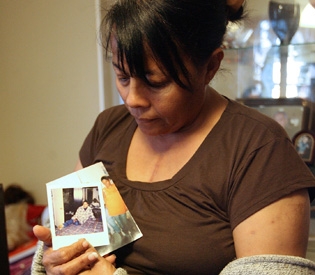
Massachusetts Parole Board releasing Valentine’s Day killer convicted of murdering mother of four
A man who was convicted of killing his girlfriend — a mother of four — after they celebrated Valentine’s Day at a local bar is set to be released from prison.
The Massachusetts Parole Board has granted parole to Mario Gonzalez, who has served 16 years of a life sentence for the murder of Luz Forty in Boston. Gonzalez, a native of Guatemala, could be deported following his release.
In 2010, he was convicted of first-degree murder for stabbing Forty to death. He was sentenced to life in prison without the possibility of parole. Then following an appeal, Gonzalez’s conviction was reduced to second-degree murder, which gave him the possibility of parole.
The Herald asked an ICE spokesperson if they plan to deport Gonzalez.
“For the safety of our officers, ICE does not comment on ongoing operations,” an ICE spokesperson said in a statement.
Luz Forty’s boyfriend Mario Gonzalez stabbed her to death in 2009. (Herald file photo)
Back in 2009 on Valentine’s Day, Gonzalez who was 29 at the time, Forty who was 38 and her mother celebrated Valentine’s Day together at a local bar. They got into a cab at the end of the night, and Forty’s mother was dropped off before the couple went to Gonzalez’s Boston apartment.
Then at 3:15 a.m., Gonzalez called 911 and reported that an unknown person had entered his apartment, and stabbed Forty. When police and EMTs arrived minutes later, they found Forty lying on a bed, bleeding heavily from six stab wounds to her shoulders and chest.
While she was being rushed to the hospital with life-threatening injuries, Forty told first responders that Gonzalez had attacked her. She later died from her injuries.
When asked about an injury to his face, Gonzalez claimed it was a result of a fight that he had been in three days earlier.
Gonzalez was eventually taken to the police station and placed in a holding cell. From inside the cell, Gonzalez told an officer that he “was the one that got hit with a beer bottle in the face.”
The officer then asked Gonzalez what really happened, and Gonzalez said he got in a fight with Forty about his drinking. The argument then escalated, and Forty hit him in the face with a beer bottle, pulled out a folding knife, and then charged at him.
Gonzalez claimed that he twisted the knife away from Forty, and then stabbed her in the back several times.
Last year, he was denied parole.
“Following his 2024 hearing, the Board recommended that Mr. Gonzalez participate in additional rehabilitative programming, including Domestic Violence programming,” the parole board wrote. “He has completed the Board’s recommendations by participating in seven programs, including one for Domestic Violence. Не has had a very positive institutional adjustment with only one disciplinary report.
“Mr. Gonzalez is also a low risk for recidivism based on his LS/CMI assessment,” the board added. “He has remained sober throughout his incarceration and identified resources for ongoing progress in this area. Mr. Gonzalez has demonstrated employment skills and supports in both the United States and Guatemala. The Board considered testimony from Ms. Forty’s sister and Suffolk County Assistant District Attorney Erin Knight. The Board concludes that Mario Gonzalez has demonstrated a level of rehabilitation that would make his release compatible with the welfare of society.”
Related Articles
Massachusetts DA ‘outraged’ that Parole Board is releasing man who killed 15-year-old girl
Paroled and picked up by ICE: Two illegal immigrant convicts turned over, 21 others win freedom in one month
‘Vampire’ killer and screwdriver slayer both denied parole in Massachusetts
Cruz: Victims’ voices deserve to be heard
The Herald asked the Suffolk DA’s Office about the board’s parole decision for Gonzalez.
“Our prosecutor attended the hearing and spoke in opposition to parole,” a spokesperson for the DA’s Office said in a statement.
Special conditions for his parole include: approve home plan before release if not deported; release to other authority ICE detainer; electronic monitoring for 6 months; supervise for drugs, testing in accordance with agency policy; supervise for liquor abstinence, testing in accordance with agency policy; no contact with victim’s family; must have mental health counseling for transition; and AA at least 3 times per week.


